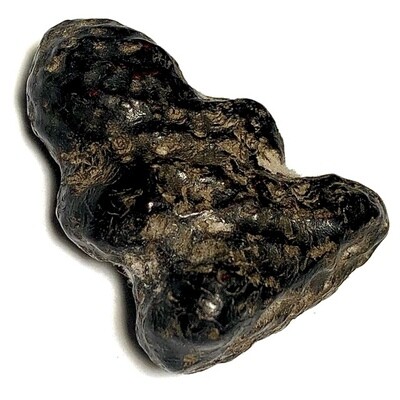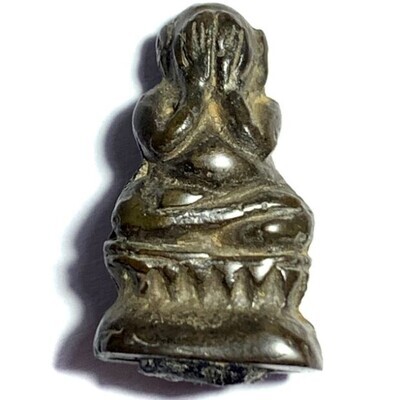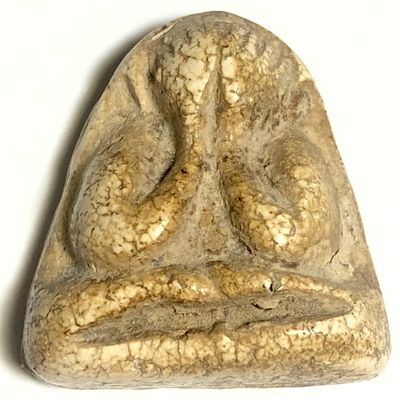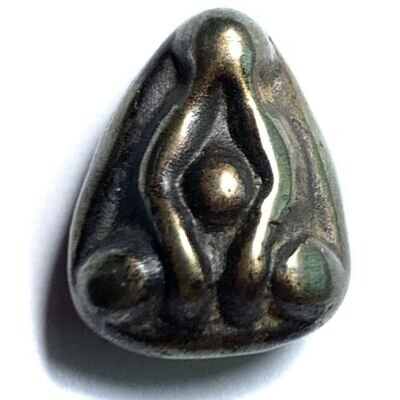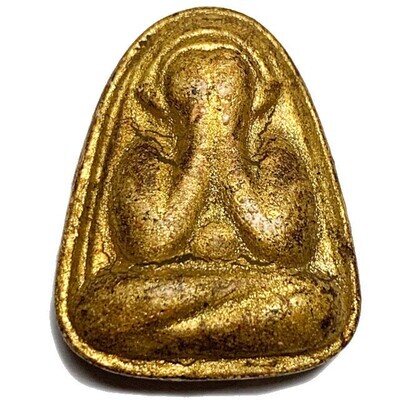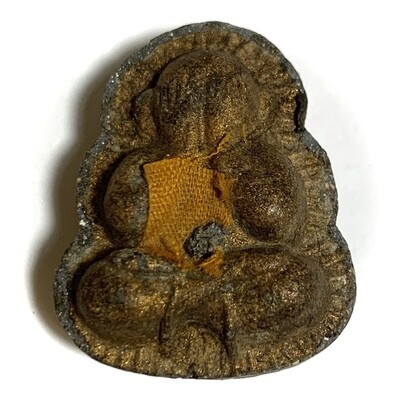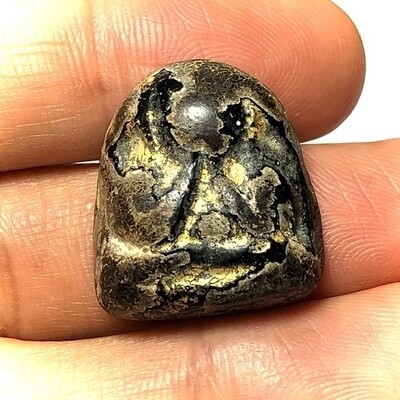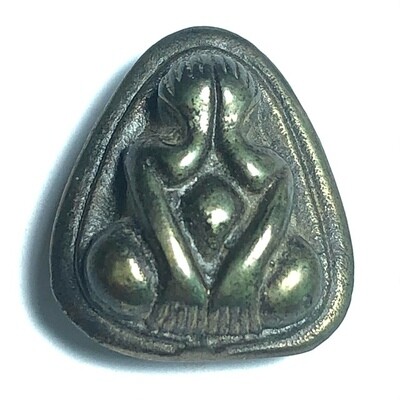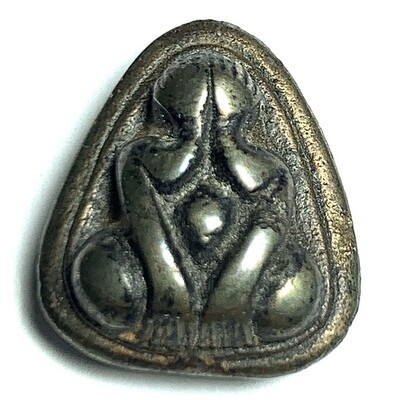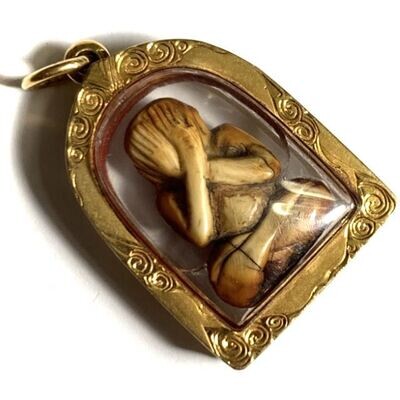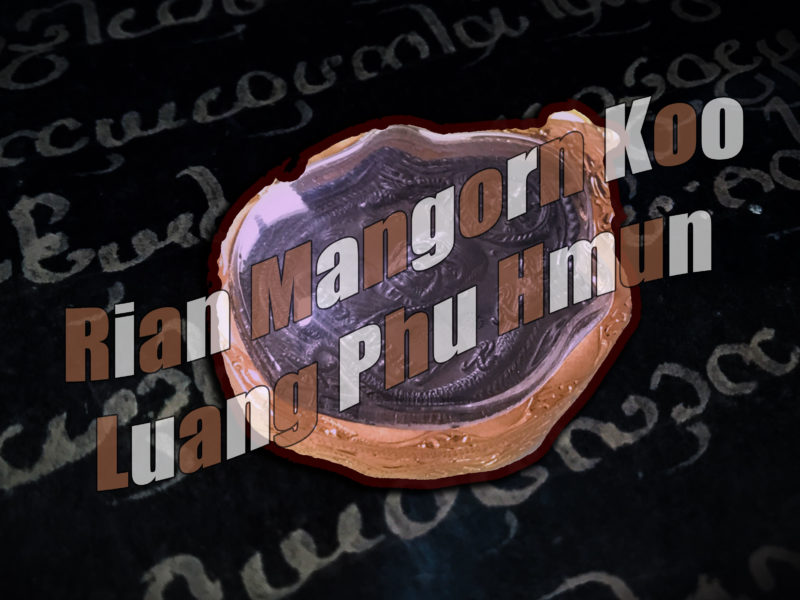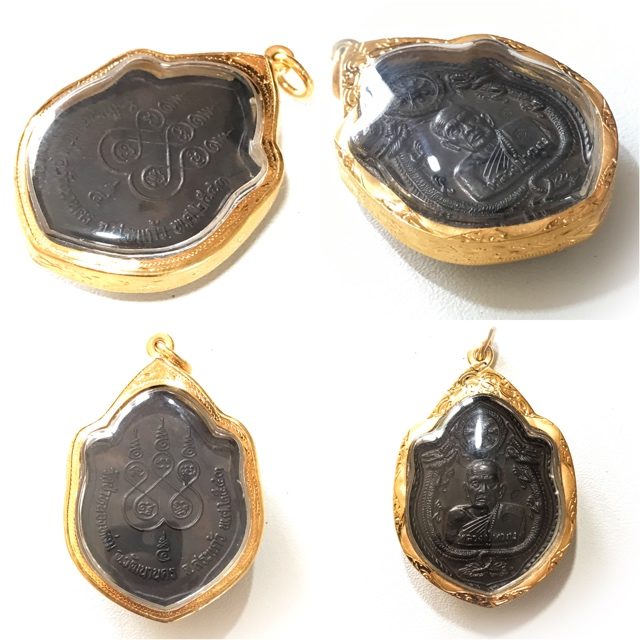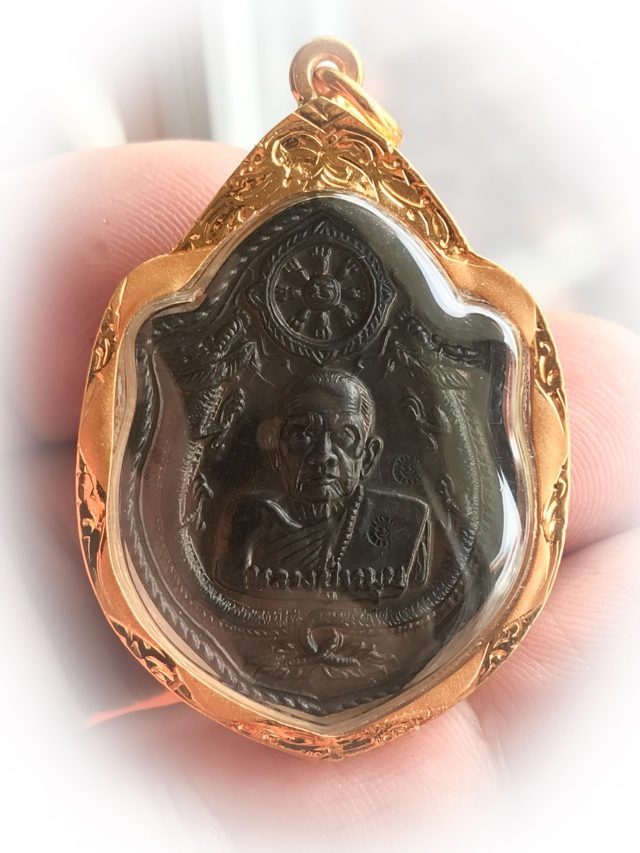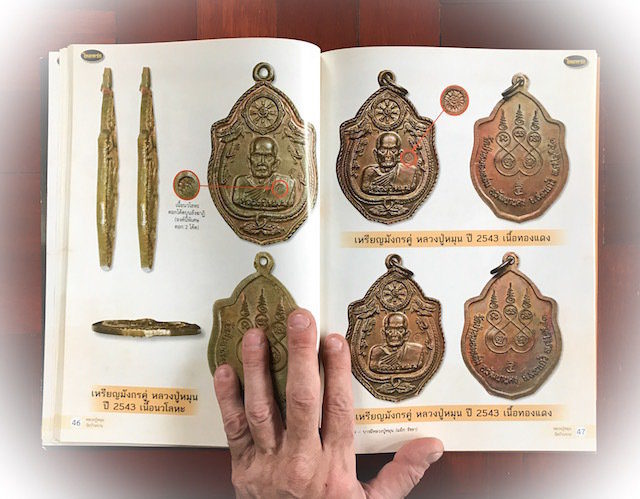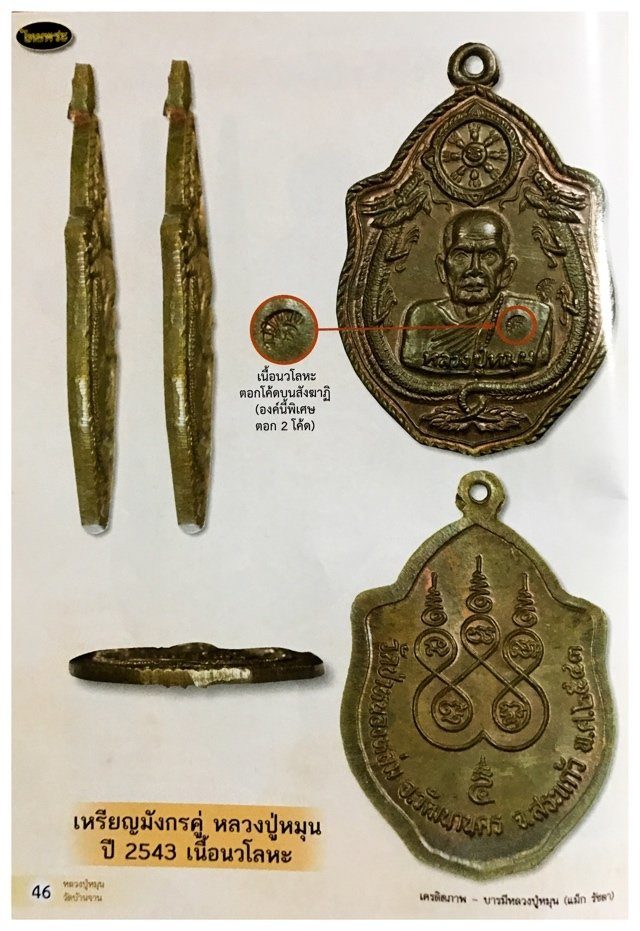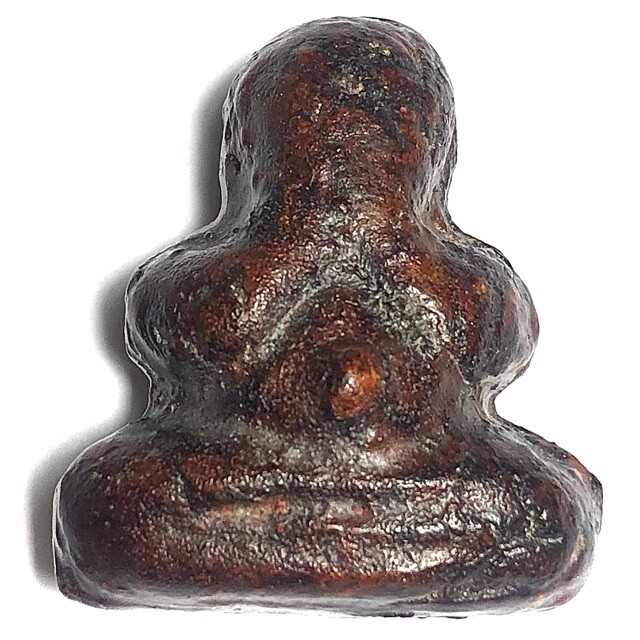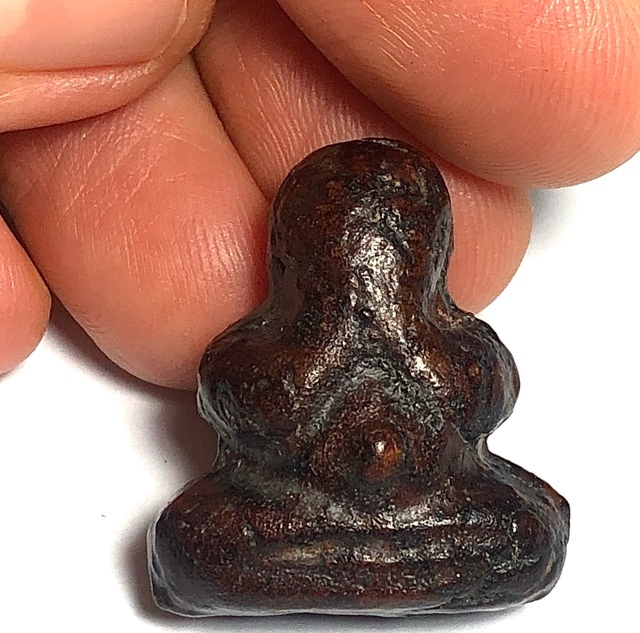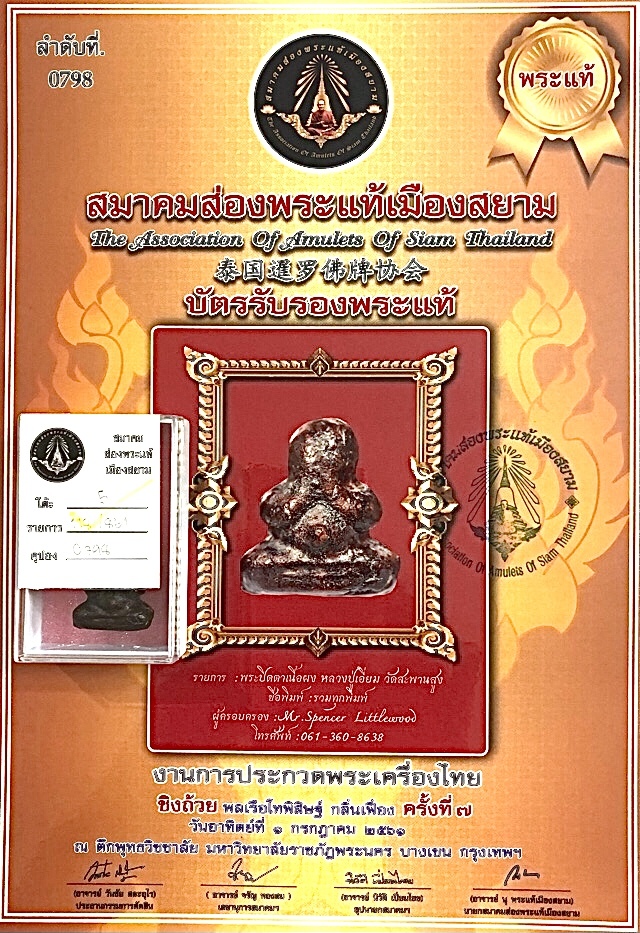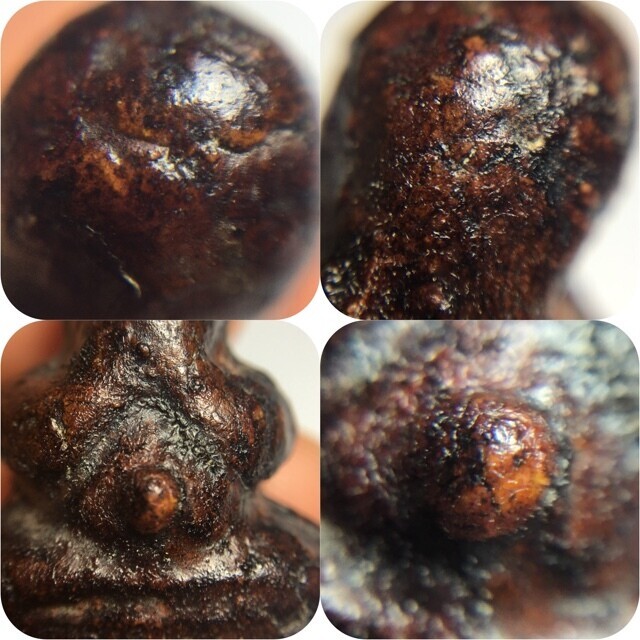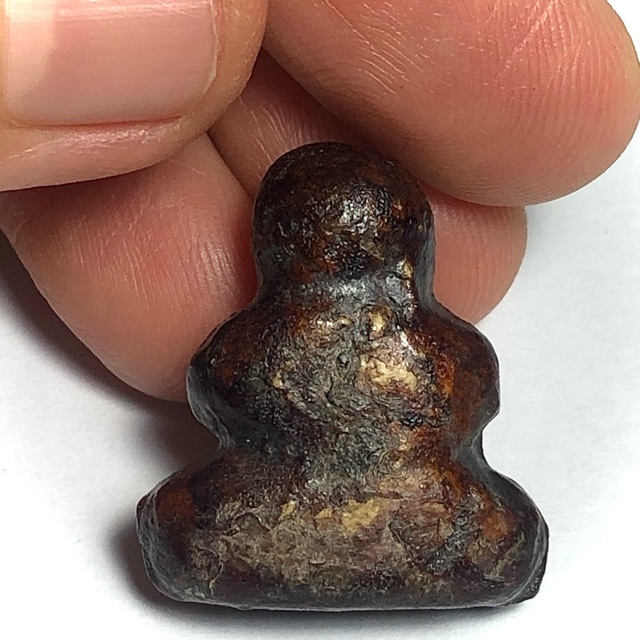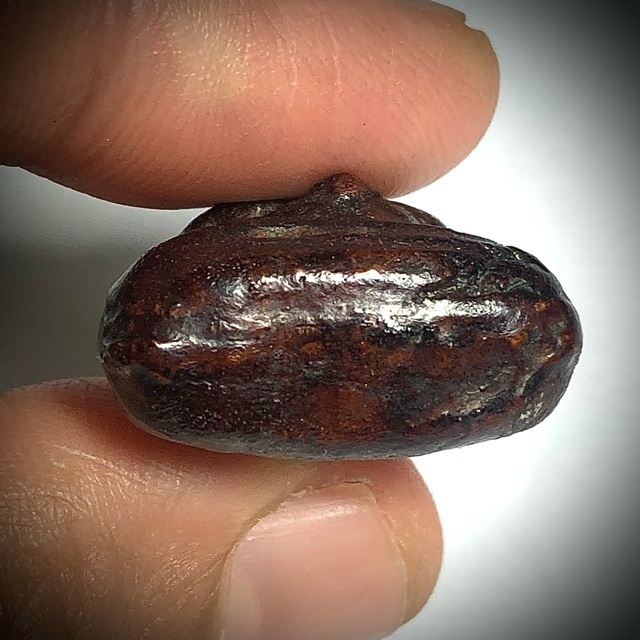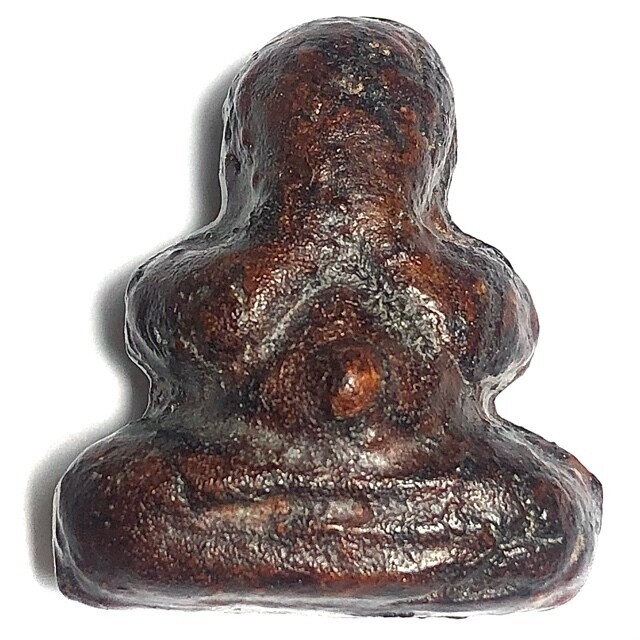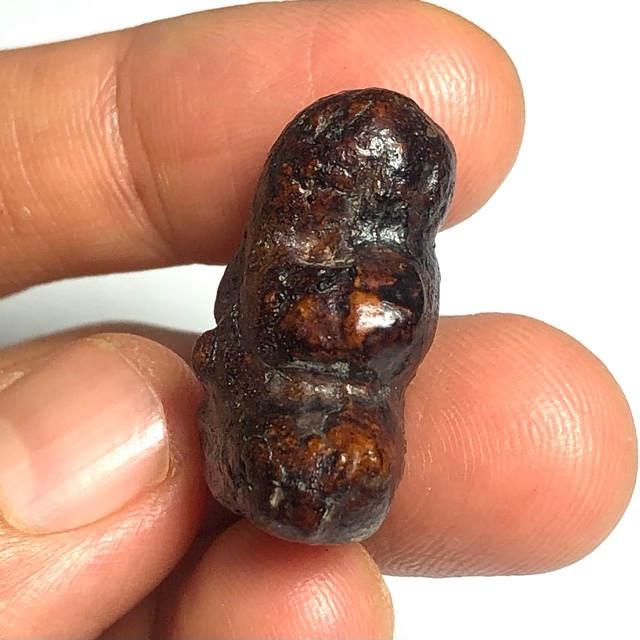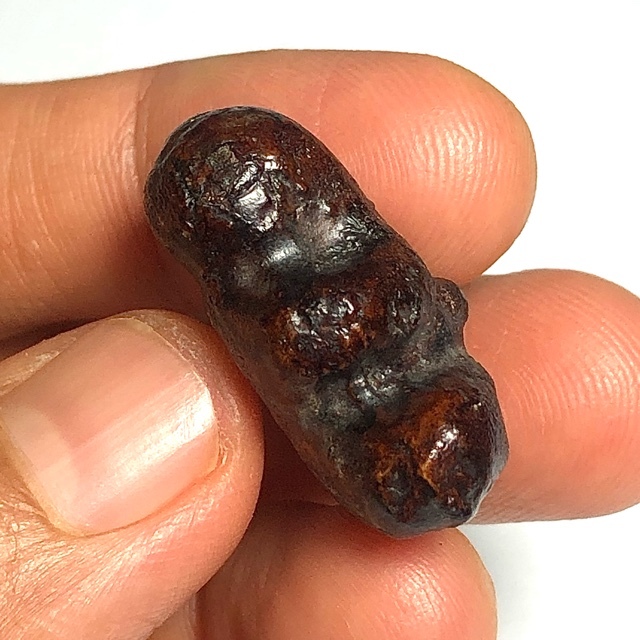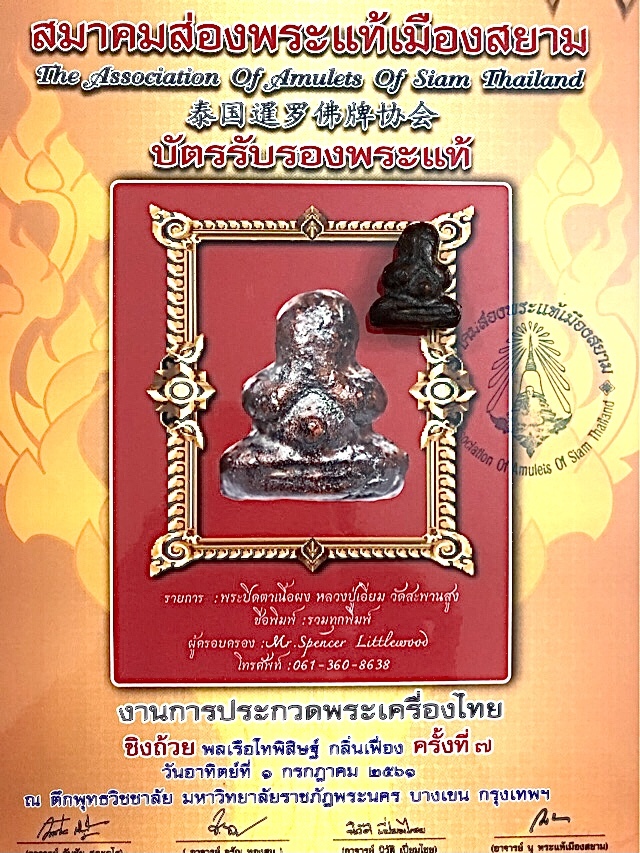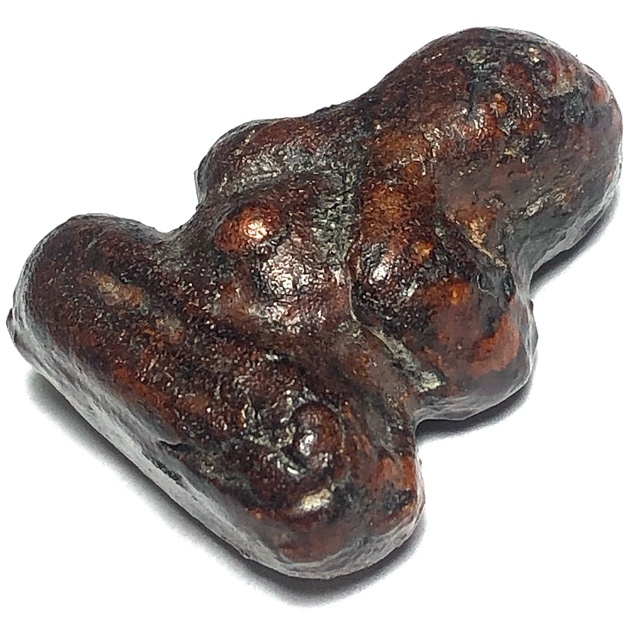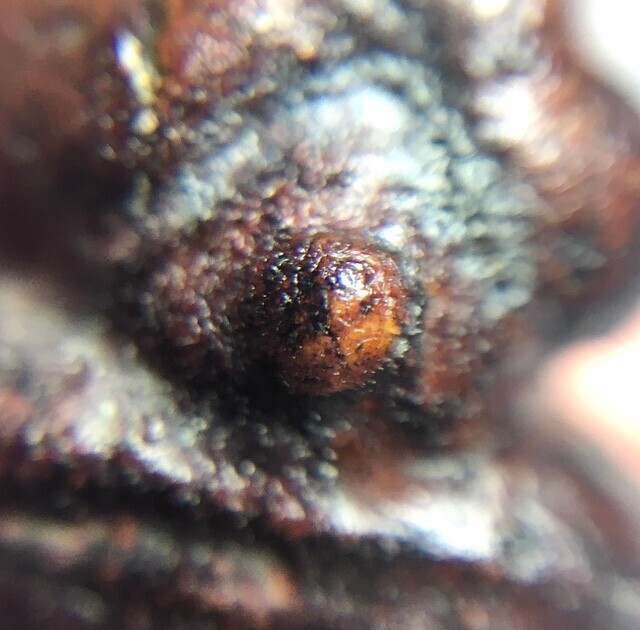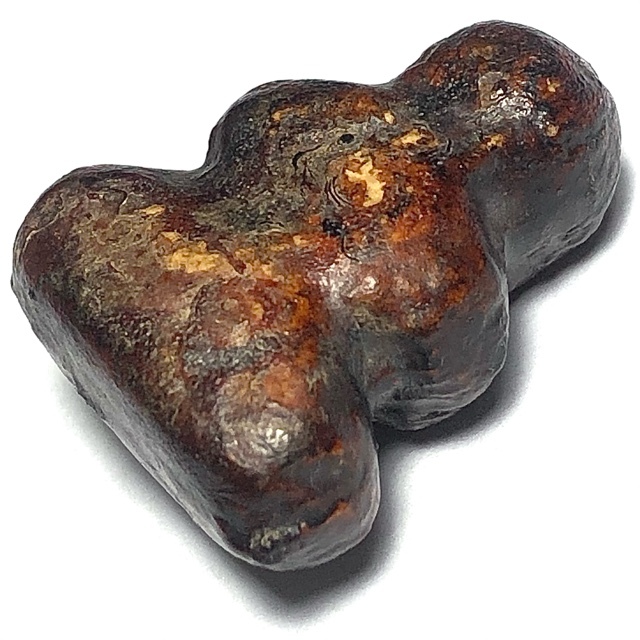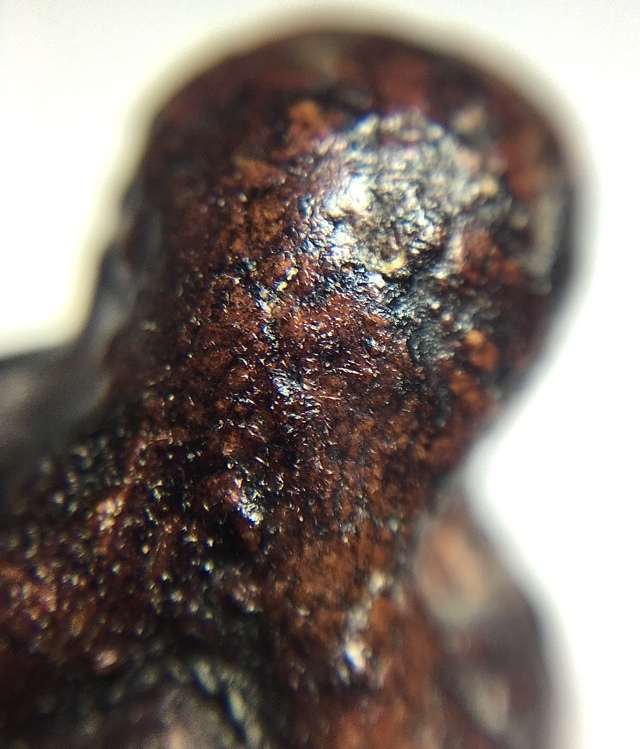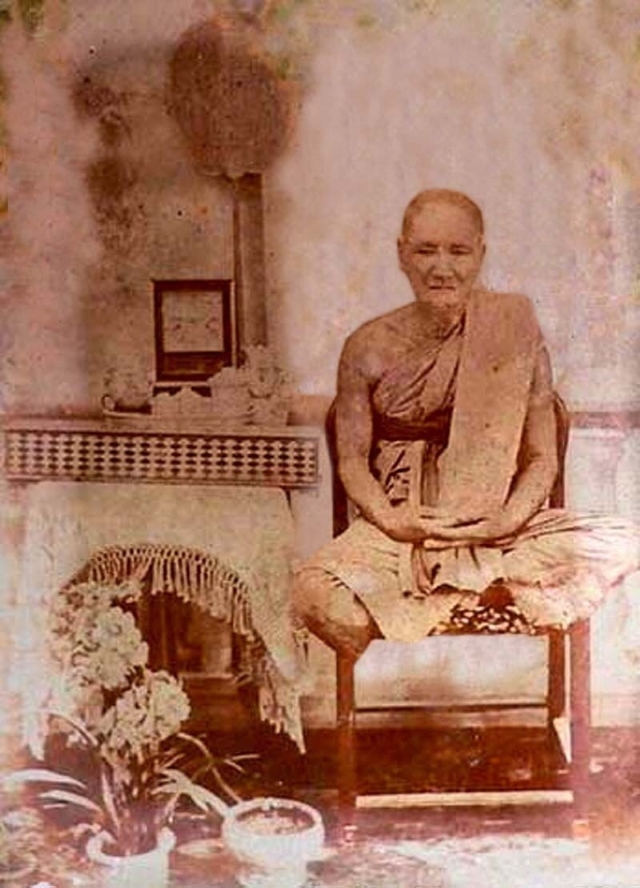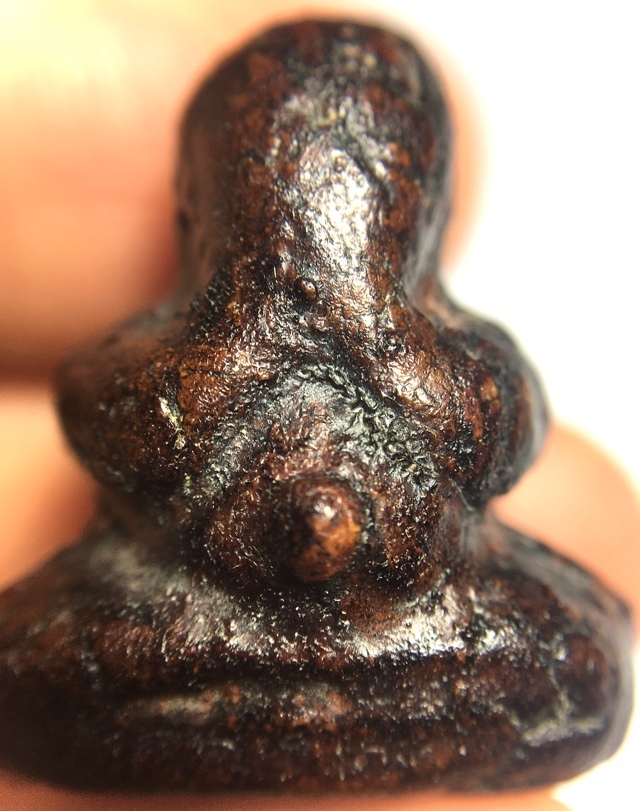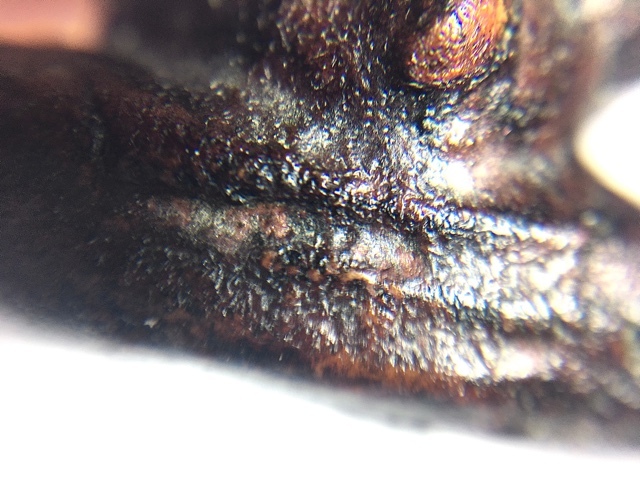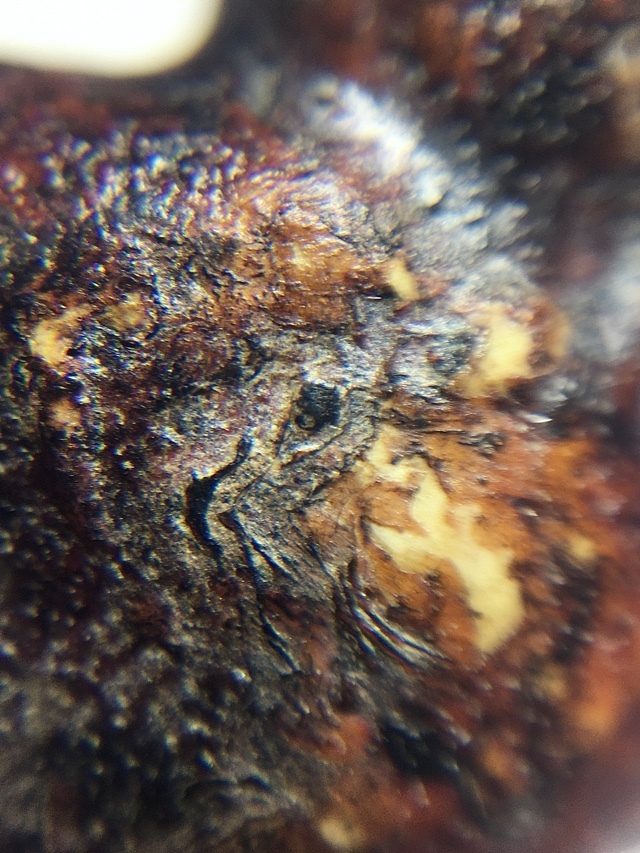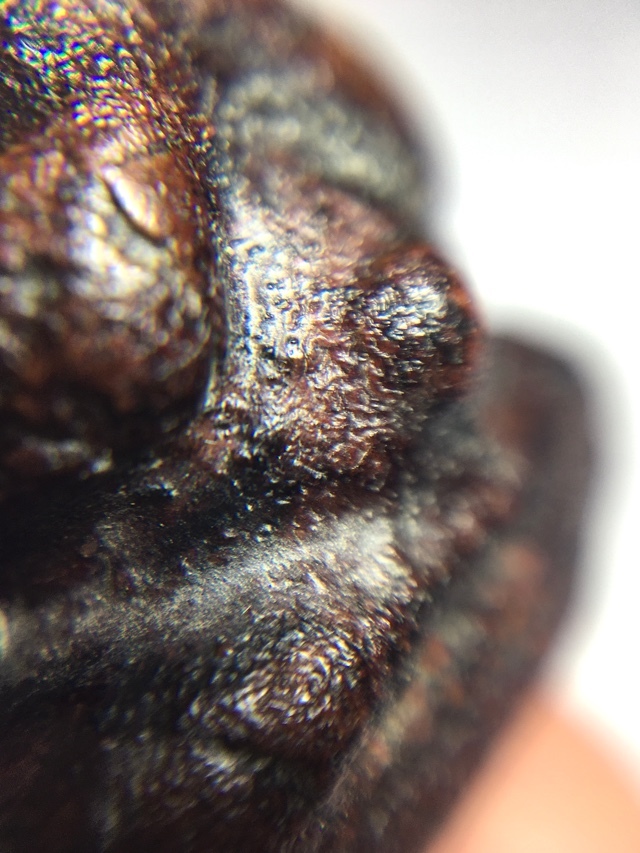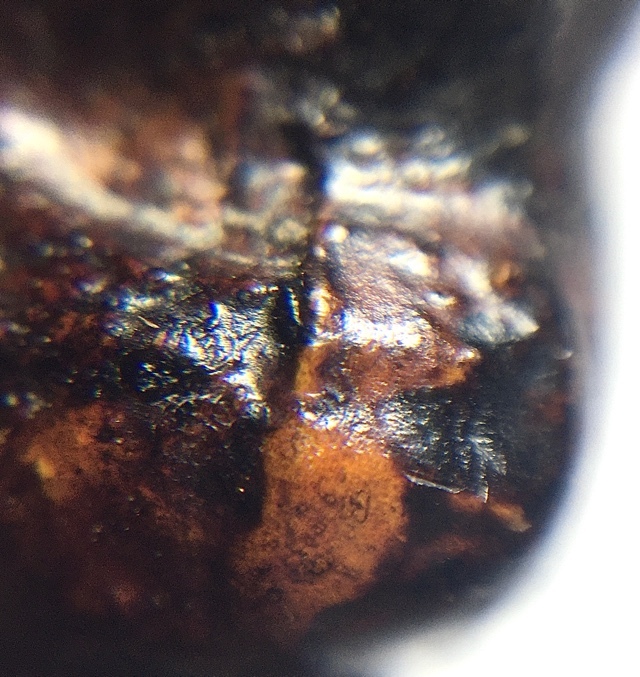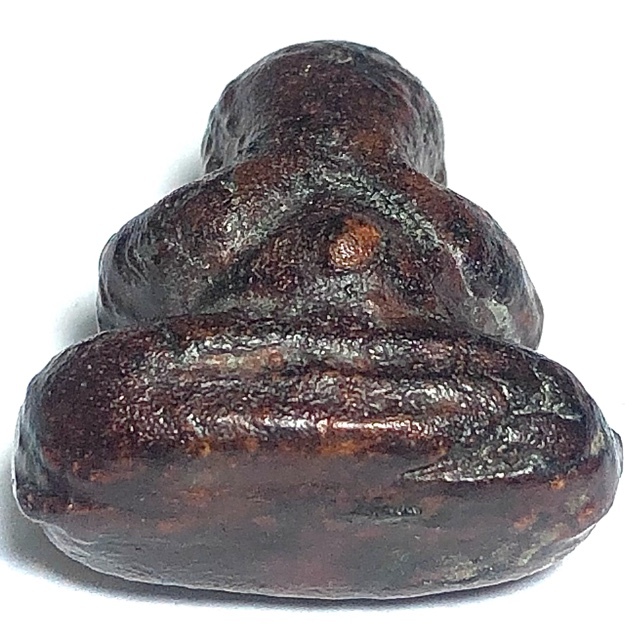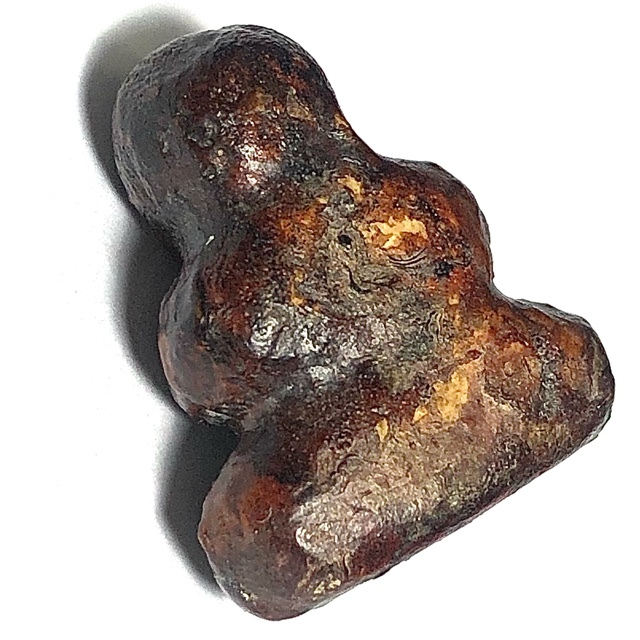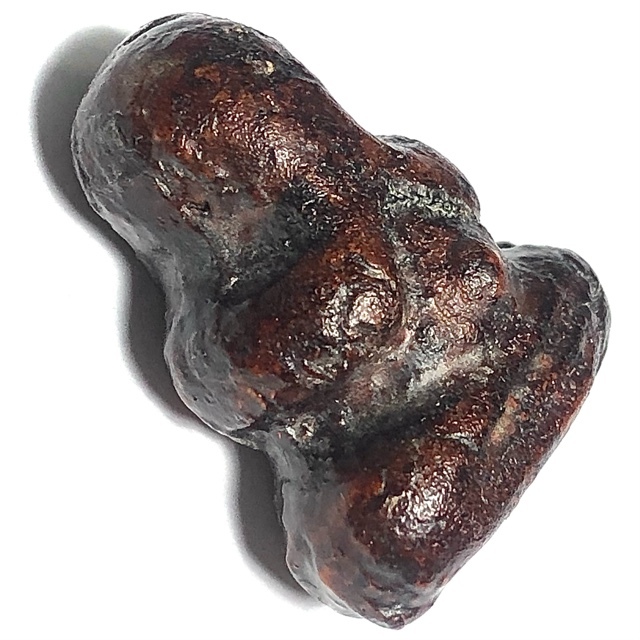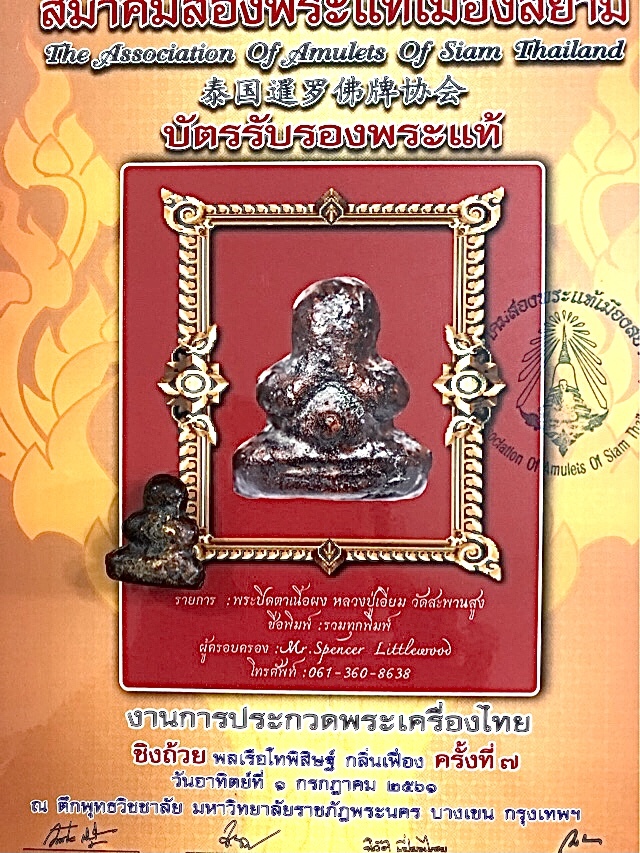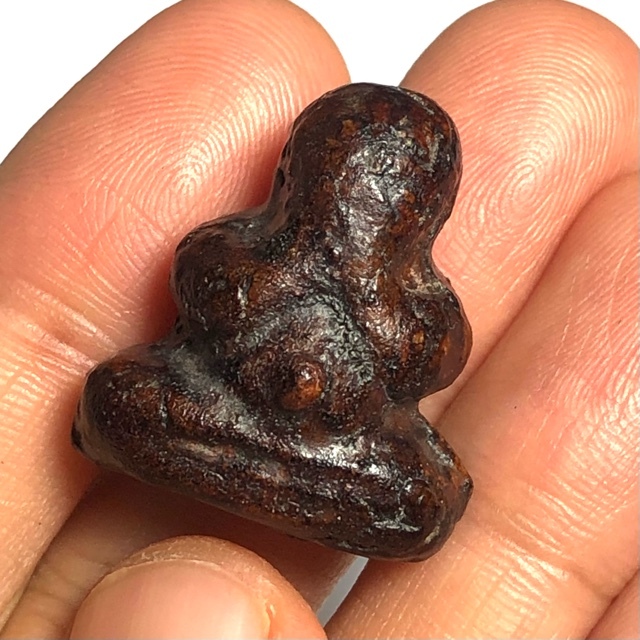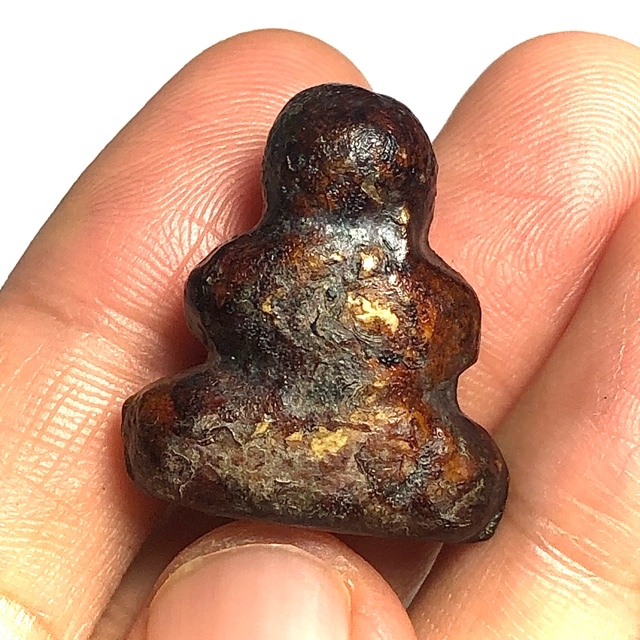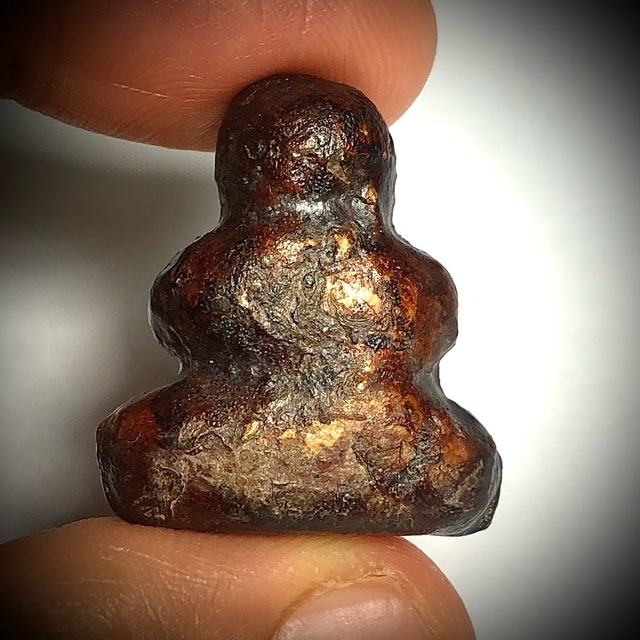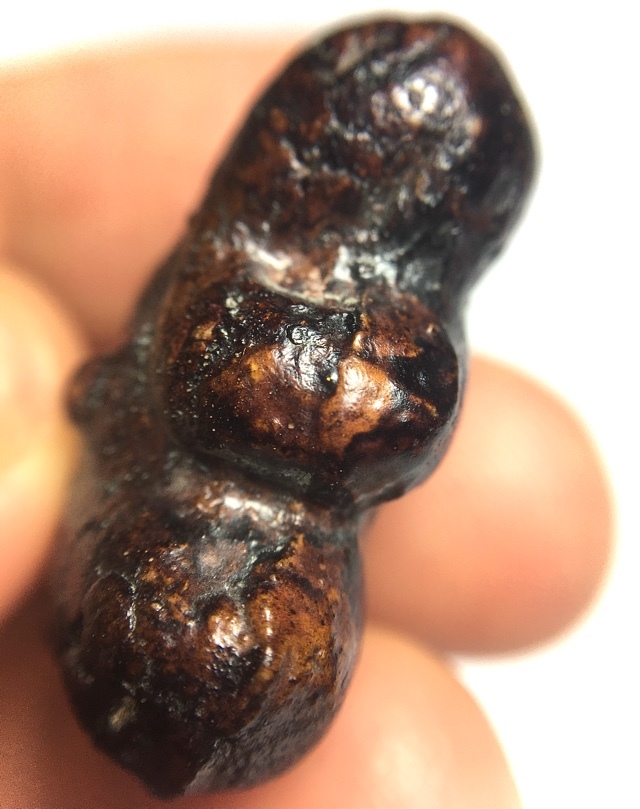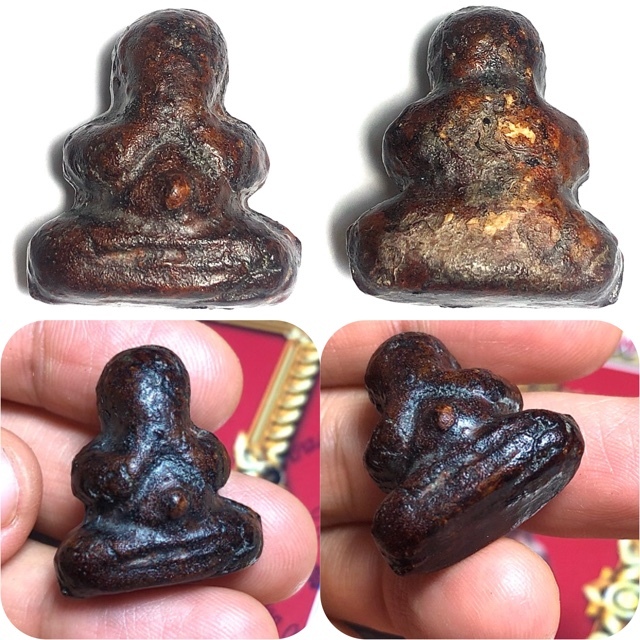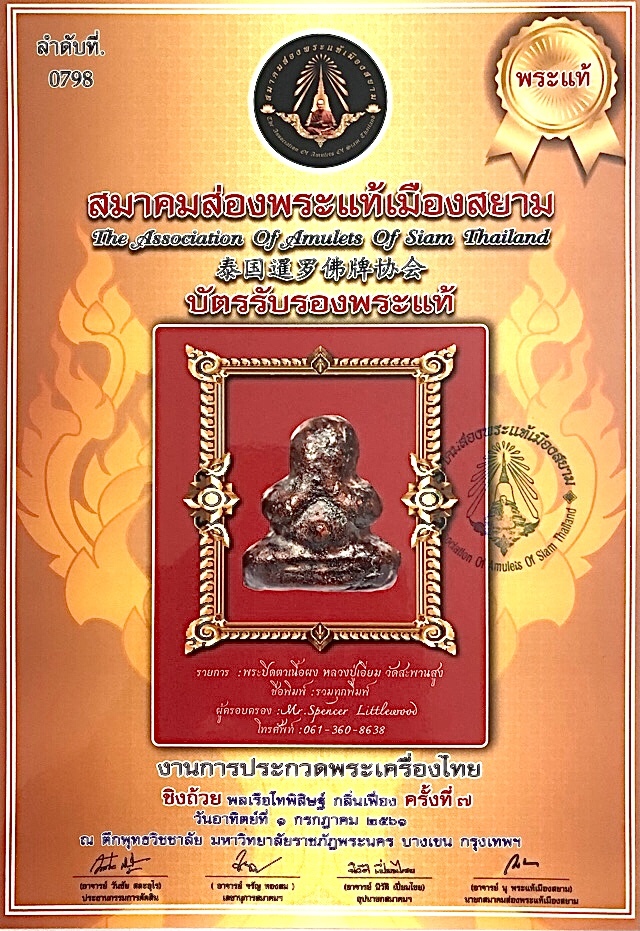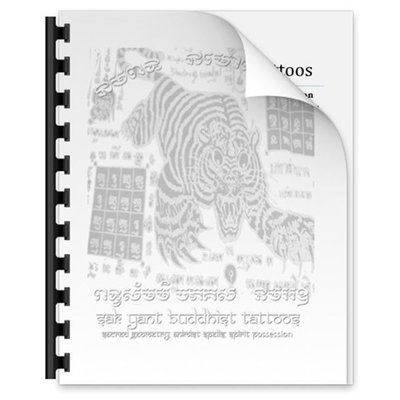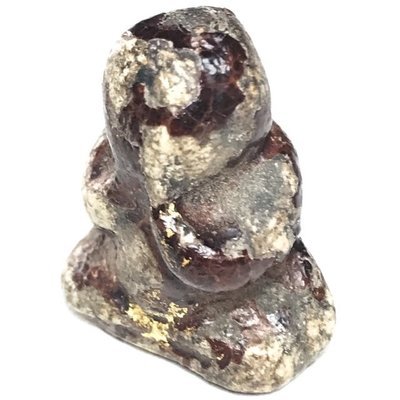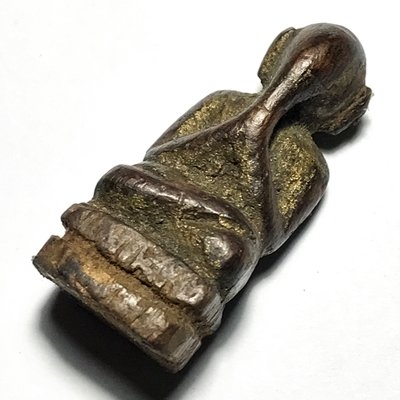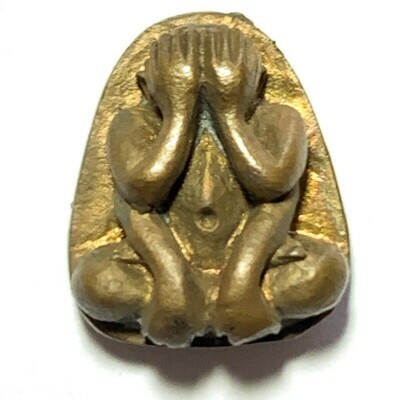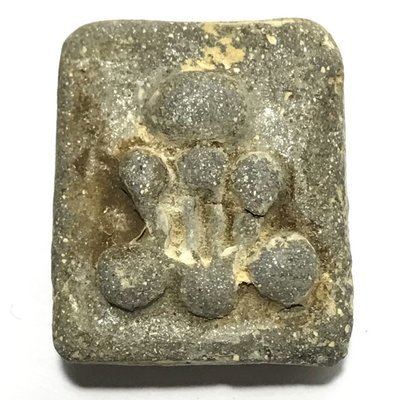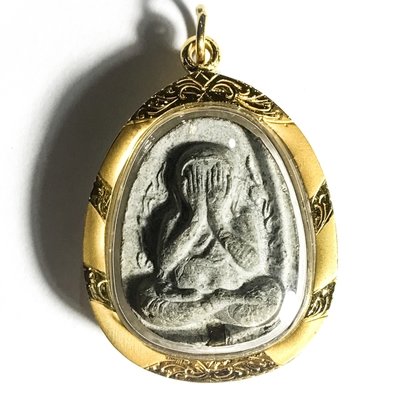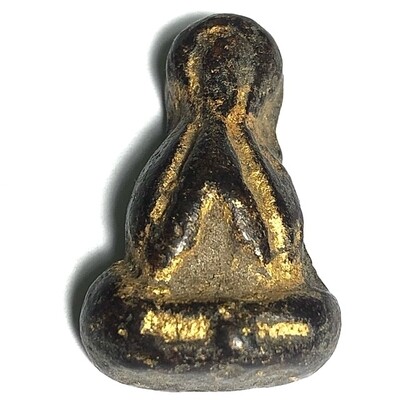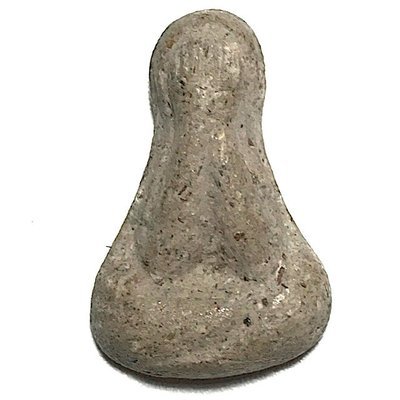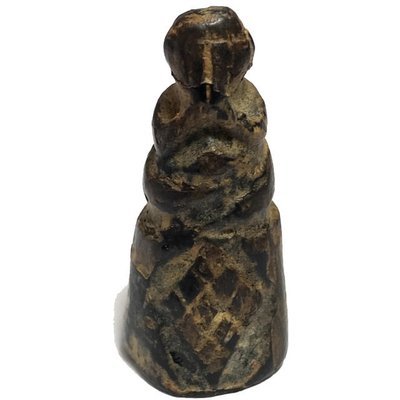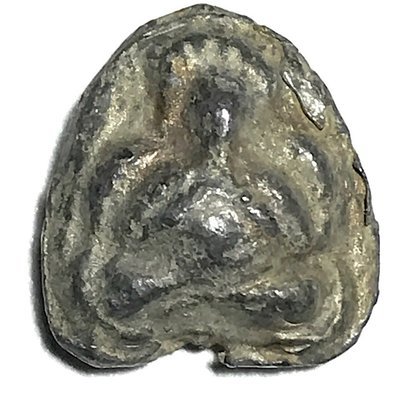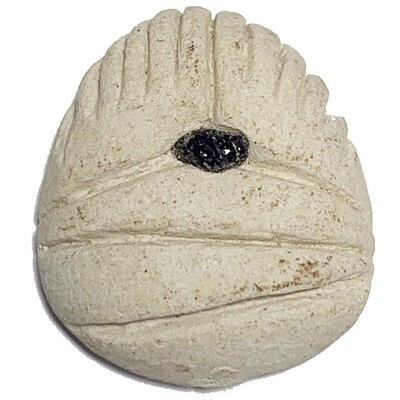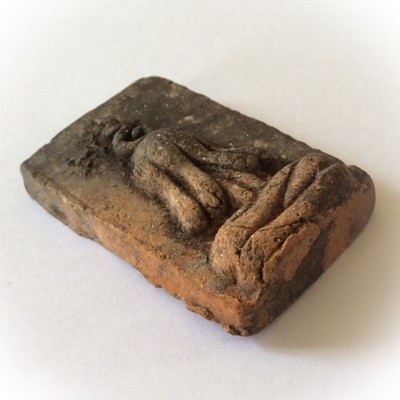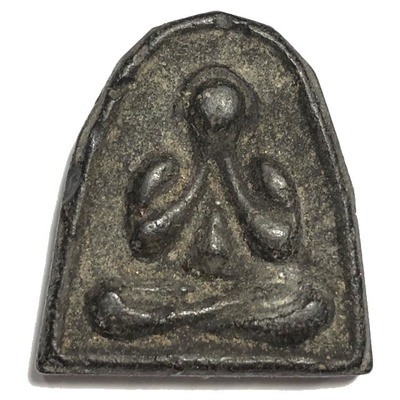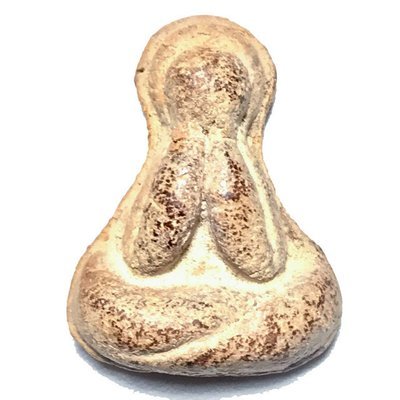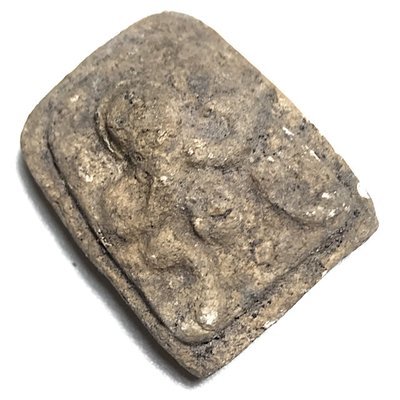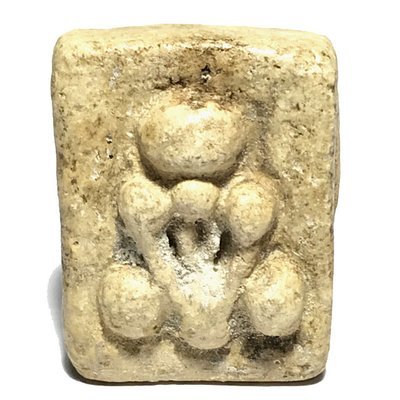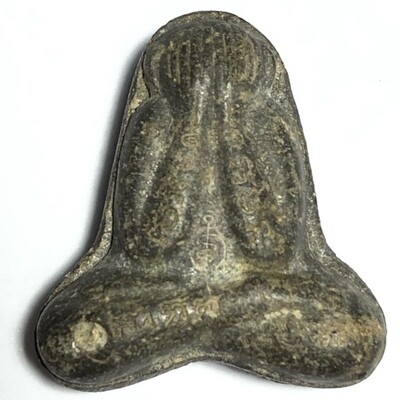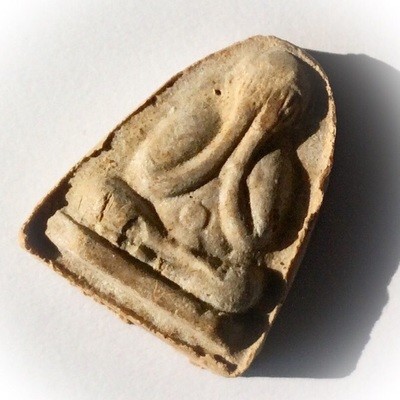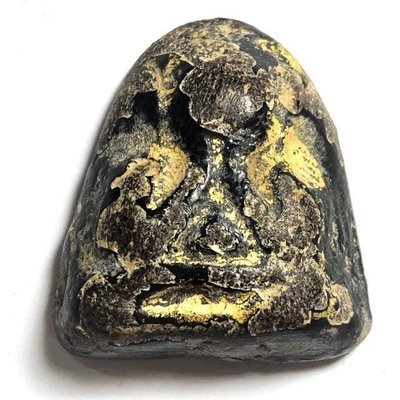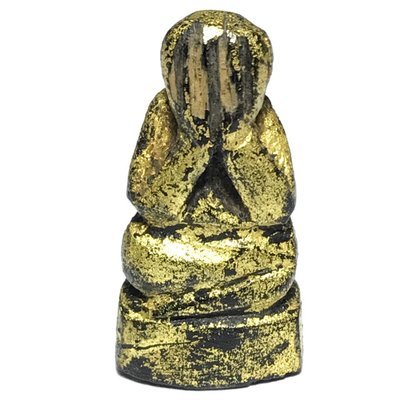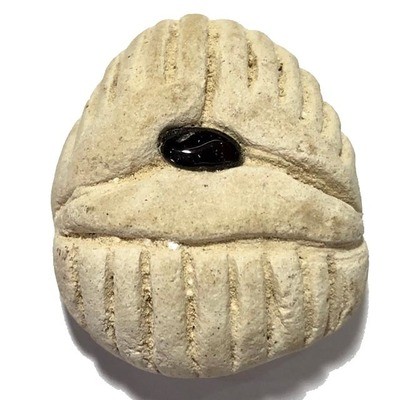A pristinely kept and extremely rare Rian Mangorn Koo Nuea Nava Loha Pim Pised Dtok Sorng Code Ma Wat Pha Nong Lom Run Sao Ha Maha Sethee 5th Lunar Saturday Blessing Ceremony Edition Guru Monk Coin, released in 2543 BE, to raise funds for the Kuti Songk Monks Huts and improve the facilities at the temple of Wat Pha Nong Lom.
This model of Rian Mangorn Koo twin dragons Monk Coin is a very rare Pim Pised (Niyom preferred) and differs from the majority of Rian Mangorn Koo Wat Pha Nong Lom Edition coins in Nava Loha, because of the double code MA stamp. Most coins of the Nava Loha series made for Wat Pha Nong Lom have only a single code Ma Stamp (on the Sangkati chest sash of the robe of Luang Phu), and only the Pim Pised special models received double code stamps. Only very few (unknown number) were distributed with double code stamp, making this not only a sacred, powerful master class amulet, but also a rare collectors piece.
The Rian Mangorn Koo of Luang Phu Hmun is, as are all of his amulets, known for the power of Jaroen Lap Wealth Increasement, and Lucky Fortunes, as well as for their Miraculous Protective Powers. Those born in the year of the dragon love to Bucha this amulet especially, for the obvious reason of the double dragon guardians.
For those with lower budgets, who seek power above collectability and rarity, we recommend to seek the Rian Mangorn Nuea Tong Daeng or Nava Loha single Code Ma, of the same edition, which carries a lower price than this special Nava Loha Pim Pised Gammagarn double code collectors edition model.
Pra Pid Ta Nuea Pong Jum Rak Pim Tapap Yai Sader Jun Niyom & Authenticity Certificate Luang Phu Iam Wat Sapan Sung
A Master-Class Top Exhibit, & a Certificated Authenticated, and very ancient preferred 'Niyom' model of Pra Pid Ta, of the Great Master Monk, Luang Phu Iam. Most rare to encounter, the Pra Pid Ta Pim Tapap Sader Jun Niyom 'Bulging Navel Terrapin Buddha' preferred class (Niyom) amulet, in Nuea Pong Jum Rak, herbal powders dipped in lacquer, a Master-Class Exhibit of the Wicha Lineage Master of Wat Sapan Sung. the Immortal Classic Pid Ta of the Great Luang Phu Iam, the Great Kroo Ba Ajarn and Originator of the Dtamra Pra Pid Ta of Wat Sapan Sung, comes with with Certificate of Authenticity from the Samakom Song Pra Tae Mueang Siam (Association of Amulets of Siam Thailand). This Pra Pid Ta of Luang Phu Iam is a seated Buddha with hands covering the eyes, and is 'Hlang Riab' (smooth flat rear face).
The amulet is made from Sacred Powders with Lacquer dip coating, and gold leaf applied. The design is inimitably recognisable as a Pim Tapap (Terrapin Turtle) model, with plump sturdy stature, and details that are seductive to the eye, and have become to be known as the style of Pid Ta Wat Sapan Sung, which has been continued by those Masters who followed him, & for which all Pra Pid Ta of Wat Sapan Sung have come to be recognized for.
Free Registered Air Parcel Shipping Worldwide is Included with this amulet. This amulet comes with its certificate of authenticity in form of a A4 size plastified photo certificate for you to frame, from the Chomrom Pra Tae Mueang Siam Association of Amulets of Siam Thailand society, and complimentary box with authenticity confirmation sticker. Free shipping is also included. Luang Phu Iam Pathomanam, was born in 2359 BE, and ordained at age 22 in 2381 BE, and passed away in 2439 BE after 59 Years of Ordained Life. He is considered the greatest Kroo Ba Ajarn of the Magical Lineage of Wat Sapan Sung Temple, who created the world famous Pra Pid Ta of Immortal Legend we know to this very day.
The Pra Pid Ta Luang Phu Iam is one of the Eminent Members of the Benjapakee of Pra Pid Ta (Top Five Pra Pid Ta Amulets) of all time. The Pra Pid Ta Luang Phu Iam Wat Sapan Sung is considered to be a ‘diamond in the world of Pra Pid Ta’, and is the fervently sought after amulet of the serious devotee and collector. It must also be said, that all of the subsequent eras of Pra Pid Ta amulets, of all Generations of Masters from Wat Sapan Sung, are among the most highly revered and sought after by Devotees of the Magic of Pra Pid Ta, for its Maha Lap wealth and luck increasing properties, Klaew Klaad, Maha Ud and Kong Grapan Protection Magic, and its Metta Maha Niyom Kaa Khaay spell for good business, as well as powerful protection against Black Magic, and improved meditation.
The Pra Pid ta were made using Sacred Yantra Powders, and 'Jum Rak' lacquer dipped. An eternal favorite of devotees around the world, from Luang Phu Iam, Kroo ba Ajarn of the Lineage of Wat Sapan Sung The Pra Pid Ta Wat of Sapan Sung Temple, made so famous by Luang Phu Iam in olden days, is a Dtamra (legendary series) that spans over various generations of abbots, all of whom have managed to gain equal fame and high repute for their Pra Pid Ta amulets, all of which preserve the style and methods of the original Wicha made so famous by Luang Phu Iam.
All editions of Pra Pid Ta Wat Sapan Sung are highly sought after. and seen as preferred Master Class category amulets (Pra Niyom), regardless from which Master they came from. Below video shows another example of a Pra Pid Ta Wat Sapan Sung, this one being from Luang Phu Iam's Looksit (Apprentice), Luang Por Tong Sukh
The Pra Pid Ta of Wat Sapan Sung is known in two major Pim (models), namely the Pim Chalud (Blind Man model), and the extremely rare Pim Dtapap (Terrapin model, which is seen much less often than the Pim Chalud). Mostly the amulets would be covered in Lacquer, with some very few exhibits in pure powders. The Pra Pid Ta Wat of Sapan Sung Temple, is a Dtamra (legendary series) that spans over various generations of abbots, all of whom have managed to gain equal fame and high repute for their Pra Pid Ta amulets, all of which preserve the style and methods of the original Wicha made so famous by Luang Phu Iam. All editions of Pra Pid Ta Wat Sapan Sung are highly sought after. and seen as preferred Master Class category amulets (Pra Niyom), regardless from which Master they came from.
The Pra Pid Ta of Wat Sapan Sung is known in two major Pim (models), namely the Pim Chalud (Blind Man model), and the Pim Dtapap (Terrapin model). Mostly the amulets would be covered in Lacquer, with some very few exhibits in pure powders, and a very few with cord wrapped binding in a cross shape, or completely cord wrapped and lacquered. However, there are also subcategories such as this Pim Sader Jun (Most favored from LP Iam), which refers to models with a large belly-button, and is one of the rarest and most highly priced Pim (models). Others can be found to have had the lacquer cleaned off them by devotees in later years. Sometimes people mistake the unlacquered version.
It is known that Luang Phu Glin, one of the Great Masters of the Wicha Pra Pid Ta Wat Sapan Sung, who learned the Wicha LP Iam along with LP Tong Sukh, was allergic to Lacquer, and so his versions never had lacquer on them and were pure powders. Luang Por Tong Sukh and Luang Phu Iam however, would more foten than not dip the Pra Pid Ta in lacquer as a protective layer. Others can be found to have had the lacquer cleaned off them by devotees in later years. It is known that Luang Phu Glin, one of the Great Masters of the Wicha Pra Pid Ta Wat Sapan Sung, was allergic to Lacquer, and so his versions never had lacqer on them and were pure powders. Luang Por Tong Sukh and Luang Phu Iam however, would more often than not, dip the Pra Pid Ta in lacquer as a protective layer. However, his devotees would smetimes help to dip in lacquer, and so both pure powder, and lacquered versions are found from LP Glin, despite his allergy.
All masters have followed the more or less the same design and method of lacquering, resulting in the amulets of each master being very similar in design, and mostly can only be differentiated by estimation of the age of the lacquer and Muan Sarn Sacred Powders in order to determine which Generation of Master the amulet came from. Luang Phu Iam's amulets are many-fold, ranging from his famous Pra Pid Ta, Rian Kanajarn Monk Coins, and many talismanic charms such as Takrut, Look Om, Hmak Tuy. Amongst his most preferred amulets are of course the Pra Pid Ta, and the Roop Lor Luang Phu Iam. Other preferred amulets are the Rian Sema Block Ueam, and Rian Khaw Hlam Dtad, as well as various other Rian Sema type coins. Some of his amulets can fetch thousands and even tens of thousands of dollars for rare preferred block presses.
Luang Phu Iam was the original root Guru (Kroo Ba Ajarn Yai) of the great Luang Phu Glin of Wat Sapan Sung, and of the Highly revered Luang Por Tong Sukh (Wat Sapan Sung), who learned, mastered, inherited, and continued his lineage Wicha. Luang Phu Glin and Luang Por Tong Sukh carried the Wicha Pra Pid Ta Wat Sapan Sung further, taking it beyond the lifetime of one single Master, and maintaining the Power and Popularity which Luang Phu Iam had brought to the Pra Pid Ta Wat Sapan Sung. The Dtamra has now been continued by Luang Phu Waas, who inherited the Wicha further into the present day.
Below; The inimitable herbal mixture of Luang Phu Iam's powerful Muan Sarn sacred powder admixture is highly evident and visible under the eye loupe, especially where the belly button of the Buddha protrudes, revealing the rich herbal content below the lacquered aged surface of the amulet.
The Temple of Wat Sapan Sung in Nontaburi, is a temple with 4 generations of famous master monks of Pra Pid Ta amulets (written in 2021), all of whom have become extremely revered each in their own time, for the continuance of the Wicha of Pra Pid Ta, Takrut, Rian, and other amulets of this Magical Temple Lineage. Wat Sapan Sung and the Pid Ta amulets for which the temple is world famous for, began its rise to fame with the appearance of the great Luang Phu Iam, and was passed down to Luang Por Glin, who passed it to Luang Por Tong Sukh, and now onwards to the current abbot Luang Phu Waas.
The Muan Sarn Sacred Powders of the Pra Pid Ta were made from Sacred Powders collected by Luang Phu Iam during his time traveling on Tudong in the forests, of the rarests and most magical herbs, flowers, pollens roots and vines. The most important ingredient which makes the Pra Pid Ta Wat Sapan Sung so powerful is of course his addition of the Pong Yant Maha Solos Mongkol Yantra Powders, and the Pong Yant Trai Saranakom Triple Gem Yantra Powders. This Yantra was a special spell which Luang Phu iam would embed within the powders and within his Takrut, and is said to have incomparably powerful powers of protection and of lucky fortunes attraction.
Below; Luang Phu Iam of Wat Sapan Sung
The Pra Pid Ta of Luang Phu Iam, (and all Pid Ta of Wat Sapan Sung) is a very preferred and popular amulet, for its undisputed powers, which have been repeatedly confirmed over the years with so many stories in the newspapers about miraculous events happening to devotees who wore the Pra Pid Ta Wat Sapan Sung of Luang Phu Iam.
It is said that Luang Phu Iam made amulets in the Pim Chalud (small and large sizes), and the Pim Tapap models are very highly revered and sought after, with his most preferred and rarest models being the Pim Sader Jun, Sader Bum, Sader Jun, and the Pim Sorng Sader (2 belly buttons), and the Pim Tapap (Terrapin Model).
The Pim Sader Jun is very rare and ancient, and fetches very high prices on the marketplace, starting at about 1000$ and upwards. However, it is a fallicy that the Pim Sader Jun was only pressed in 2495 BE, as Luang Por Tong Sukh kept pressing the Sader Jun amulets with the very same block press until it broke sometime between the years 2510 BE and 2520 BE. The Pim sader Jun and Pim Sorng Sader remain his rarest and most highly valued models, fetching extremely high prices with collectors.
The Pra Pid Ta Wat Sapan Sung are highly renowned for their powers of Maha Pokasap Metta Maha Niyom Klaew Klaad Kong Grapan Chadtri, to bring great wealth and protection to the wearer.
Kata Pra Kawambadee
(This kata is for increasing ones wealth and belongings and good fortune);
Namo Puttassa Kawambadtissa
Namo Tammassa Kawambadtissa
Namo Sangkassa Kawambadtissa
Sukha Sukha Warang Na Mo Puttaaya Ma A U
Tugkhang Anijjang Anatta Jewa Segkhaa Tammaa Yataa Put Mo Na
